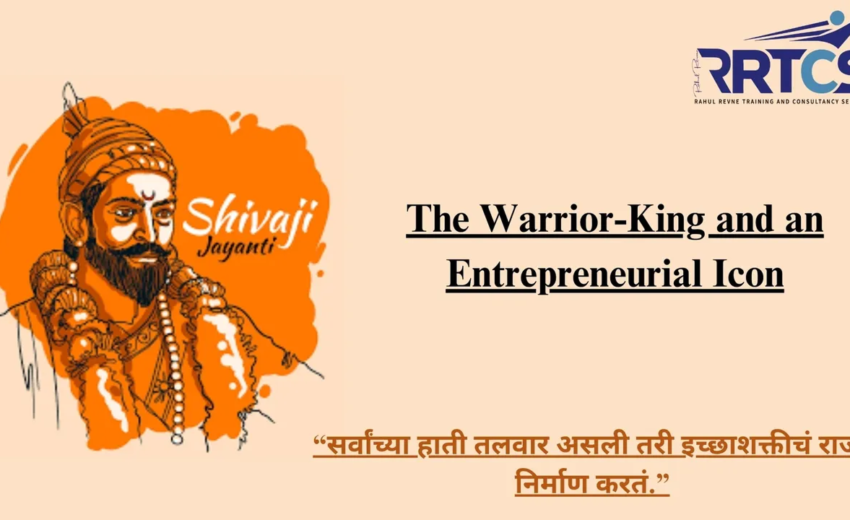
Shiv Jayanti, the birth anniversary of Chhatrapati Shivaji Maharaj, is an occasion of great pride and reverence in India. Shivaji Maharaj was not just a valiant warrior and a visionary king but also an exceptional strategist and administrator. His leadership principles, strategic acumen, and people-centric governance hold invaluable lessons for modern entrepreneurs. This article explores his life, his title as ‘Chhatrapati,’ and the entrepreneurial insights we can derive from his remarkable journey.
Who Was Shivaji Maharaj?
Born on February 19, 1630, in the Shivneri Fort, Shivaji Maharaj was the founder of the Maratha Empire. He was a fearless warrior, a tactical genius, and a just ruler who championed the cause of Swarajya (self-rule). With an unwavering commitment to his people, he established a robust administration, introduced innovative military tactics, and created a powerful navy to safeguard India’s coastline. His governance model and inclusive policies made him one of the greatest kings in Indian history.
Why Is He Called Chhatrapati?
The title ‘Chhatrapati’ was bestowed upon Shivaji Maharaj after his coronation in 1674, signifying his position as the supreme sovereign of the Maratha kingdom. The word ‘Chhatrapati’ translates to ‘Paramount Sovereign’ or ‘Protector of the People,’ highlighting his role as a leader dedicated to the welfare and protection of his subjects. Unlike feudal titles conferred by foreign rulers, ‘Chhatrapati’ was a self-assumed title, emphasizing his vision of an independent and self-reliant empire.
Entrepreneurial Lessons from Shivaji Maharaj’s Life
1. Visionary Leadership: The Power of a Clear Goal
Shivaji Maharaj’s vision of Swarajya was not just a dream but a well-planned mission. Entrepreneurs must develop a strong vision for their business and work relentlessly to achieve it. A well-defined mission and a roadmap to execution are crucial for long-term success.
2. Strategic Thinking and Innovation
Shivaji Maharaj’s military strategies, such as guerrilla warfare and fort-based defense systems, were groundbreaking. He understood the importance of adaptability and innovation. Similarly, businesses must embrace innovation and adapt to changing market dynamics to maintain a competitive edge.
3. People-Centric Approach
Shivaji Maharaj believed in empowering his people, giving them autonomy, and ensuring their welfare. His administration was fair and efficient, emphasizing meritocracy. Entrepreneurs can learn to build strong teams, empower employees, and create an inclusive work culture.
4. Resource Management and Financial Prudence
Despite limited resources, Shivaji Maharaj efficiently managed his finances, built a strong economy, and ensured self-sufficiency. Entrepreneurs must prioritize financial discipline, optimize resources, and invest in long-term sustainability.
5. Strong Branding and Reputation Management
Shivaji Maharaj was known for his ethics, integrity, and commitment to justice. He carefully built his reputation as a protector of the people. In business, maintaining a strong brand image and adhering to ethical values can build trust and credibility among customers.
6. Resilience and Risk-Taking Ability
Throughout his life, Shivaji Maharaj faced numerous challenges, including conflicts with the Mughals and the Adilshahi Sultanate. However, his resilience and calculated risk-taking abilities helped him turn adversities into opportunities. Entrepreneurs should embrace challenges and take calculated risks to drive growth and success.
Practical Takeaways for Entrepreneurs
- Define a clear vision and align your team with a common goal.
- Foster innovation and adaptability to stay ahead in a competitive market.
- Prioritize ethical leadership and strong governance.
- Invest in building a loyal and motivated team.
- Maintain financial discipline and manage resources efficiently.
- Be resilient and ready to face challenges with a strategic mindset.
Shivaji Maharaj’s life is an embodiment of courage, wisdom, and strategic brilliance. His principles of leadership, innovation, and resilience are timeless lessons for entrepreneurs aiming to build sustainable and successful businesses. As we celebrate Shiv Jayanti, let us imbibe his values and strive to create impactful businesses that contribute to society’s progress.
About the Author
Rahul Revne is a business consultant and management strategist, specializing in helping organizations transition from individual-driven to system-driven enterprises. With expertise in HR, business consulting, and productivity enhancement, he provides actionable insights for entrepreneurs to scale their ventures effectively. Visit www.rahulrevne.com to learn more about his consulting services.
References
- ‘Shivaji and His Times’ by Jadunath Sarkar
- ‘Leadership Secrets of Shivaji’ by Ranjit Desai
- Various historical sources and business case studies













Emon Ahmed July 6, 2023
Convis is a game-changer for my consulting business. The customization options and Elementor support allow me to create a website that truly represents my brand. Highly recommended!
Convis July 6, 2023
Thank you for taking the time to share your experience and leave a review. Your feedback is invaluable to us, and we truly appreciate your support.
Hasibur Rahman July 6, 2023
The custom Elementor widgets in Convis have made my website stand out. With just a few clicks, I can add testimonials, pricing tables, and more, enhancing the overall professionalism of my consulting website.